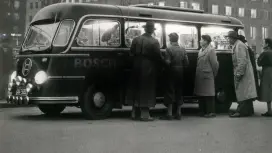Taking a stand
The Bosch-Kreis and resistance to Hitler
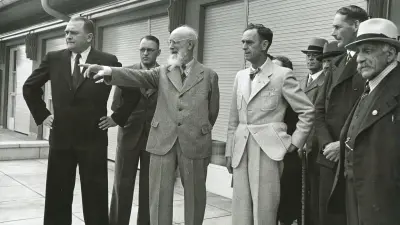
On July 20, 1944, an attempt to assassinate Adolf Hitler failed. It was hoped that this coup d’état would put an end to Nazi rule. The Bosch-Kreis (Bosch circle), a small group of senior Bosch executives, was involved in the assassination plot.
“Why doesn’t someone just kill the guy?” Robert Bosch asked this question in private, as his daughter Eva recalls. By “guy,” he meant none other than Adolf Hitler. This emotional outburst, which could easily have resulted in a death sentence if uttered elsewhere, is a clear expression of what Robert Bosch thought of National Socialism. It is also an expression of despair when a man like Bosch – whose motto was “Never forget your humanity, and respect human dignity in your dealings with others” – wishes death on another person. But it was especially the Nazi regime’s inhuman behavior toward minorities and victims of persecution that caused him to oppose it. He also deplored Hitler personally. Following his first meeting with Hitler shortly after the dictator took power, Bosch said: “This individual wants to be a statesman and doesn’t know what justice is.” Moreover, an economic policy geared toward a command economy and protectionism clashed with the views of the internationally minded entrepreneur, who sold and manufactured his products worldwide.
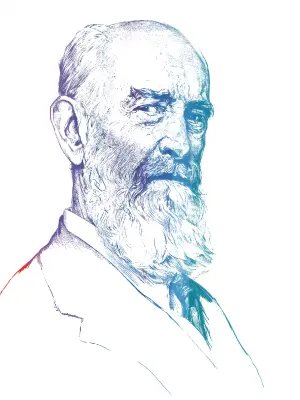
Never forget your humanity, and respect human dignity in your dealings with others.
United in abhorrence
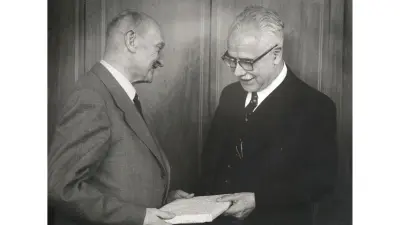
The Bosch-Kreis, or Bosch circle, a highly diverse group of men who probably would have never come together under different circumstances, shows that Robert Bosch was not alone in his opinion to resist the Nazi regime. What united them all was that they worked for Bosch, shared a deeply felt abhorrence for the National Socialist regime, and were searching for a way of ridding Germany of this blight. Robert Bosch had a close and trusting relationship with his successor at the company, Hans Walz, and the head of his private secretariat, Willy Schloßstein. It is likely that he frequently spoke to them about the political situation and the possibilities of resistance. He also spoke to Albrecht Fischer, an architect and economically liberal democrat who joined Bosch as an economic policy advisor in 1934. It was through him that Paul Hahn — a teacher, painter, chief of police, and steel furniture designer — came to the company a year later to oversee the construction of the Robert Bosch Hospital. The educator Theodor Bäuerle was the founder of Verein zur Förderung der Volksbildung (Society to Support Public Education), which Robert Bosch headed. He joined Bosch in 1936.
Members of the Bosch-Kreis
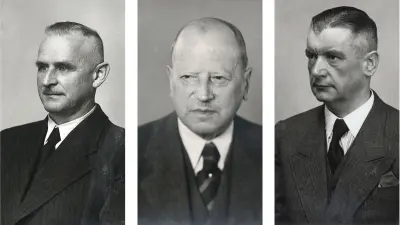
As members of the Bosch-Kreis, all the above consulted closely with one another. However, contact with resistance circles was established by Carl Friedrich Goerdeler, a Hitler opponent, who, after resigning as mayor of Leipzig, was also taken on as a consultant by Bosch in 1937. He had the necessary contacts and used the trips he took to various countries in his role as a consultant to warn people about the risk of war posed by Nazi Germany – albeit with limited success.
The resistance against the Nazi regime that formed within the German military prior to and during the second world war was backed up by a group of civilians. They were to take over the government once Hitler had been deposed. Goerdeler was slated to become chancellor in this new government. After the attempt to assassinate Hitler on July 20, 1944, had failed and the conspirators had been hunted down and arrested, Fischer, Hahn, and Schloßstein were thrown into jail along with Goerdeler. What ultimately saved the lives of most of the Bosch-Kreis members was Bosch’s close relationship with the SS officer Gottlob Berger, whose father was an old acquaintance of Robert Bosch. He ensured that Schloßstein was released and that Hahn and Fischer were sentenced to imprisonment rather than death. But for Goerdeler, there was no more that could be done. He was executed in Berlin on February 2, 1945.
Author: Christine Siegel
